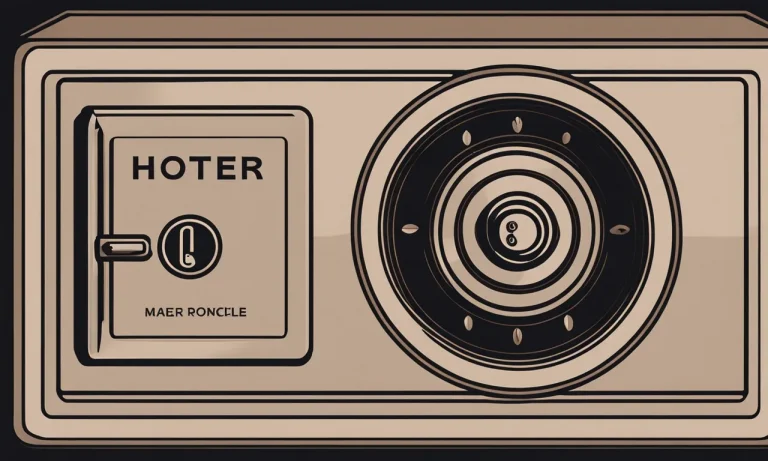Finding a great hotel rate only to see it plummet before your stay is frustrating. If you’ve booked a non-refundable room but then spot a lower price, is it possible to still get the deal?
The good news is hotels often will match price drops if approached strategically.
If you’re short on time, here’s a quick answer to your question: If a hotel rate drops after you book, contact the property directly and politely ask if they can adjust your rate to the new lower price.
Provide documentation of the price difference. Flexible travelers may also be able to rebook at the lower rate and cancel the original booking.
This comprehensive guide will provide tips and best practices for securing the best rates when hotel prices fall after you’ve booked. Learn how to monitor for price drops, match lower rates, and use cancellations and rebooking to maximize hotel savings.
How to Track Hotel Rates After Booking
So, you’ve booked your dream hotel for your upcoming vacation, only to find out later that the price has dropped.
Don’t worry, there are ways to track hotel rates after booking and potentially get a lower rate for your stay. Here are some strategies to consider:
Leverage Third-Party Tracking Tools
One way to stay on top of hotel rates is to utilize third-party tracking tools. These tools monitor prices for specific hotels and alert you if there are any changes. They can help you identify when prices drop so you can take advantage of the lower rates.
Some popular tracking tools include Kayak and Trivago, which provide comprehensive search options and price tracking features.
![]()
Manually Check Hotel Site Regularly
If you prefer a more hands-on approach, you can manually check the hotel’s website regularly to see if there have been any rate changes. Hotels sometimes offer last-minute deals or promotional discounts that may not be reflected on third-party booking sites.
By checking the hotel site directly, you can ensure that you don’t miss out on any potential savings. Don’t forget to clear your cache and cookies to see the most up-to-date prices.
Set Up Price Alerts
Another effective strategy is to set up price alerts. Many travel websites and apps allow you to create alerts for specific hotels or destinations. By inputting your desired hotel and travel dates, you’ll receive notifications if the price drops. This way, you don’t have to constantly monitor the rates yourself. Just sit back, relax, and let the alerts come to you.
Tracking hotel rates after booking is a smart way to potentially save money on your accommodation. Whether you choose to use third-party tracking tools, manually check the hotel site, or set up price alerts, staying informed about rate changes can help you secure the best possible deal for your stay.
Asking Hotels to Match a Lower Rate
Contact the Hotel Directly
When you come across a lower rate for your hotel stay after booking, it’s worth contacting the hotel directly to see if they are willing to match the price. Many hotels have a policy in place that allows them to match a lower rate found elsewhere, so it’s always worth a try.
Give them a call or send them an email explaining the situation and politely ask if they can adjust your booking to the lower rate.

Be Friendly Yet Persistent
Remember, when contacting the hotel, it’s important to be friendly and polite. Hotel staff are more likely to help you if you approach the situation with kindness. However, don’t be afraid to be persistent if you believe you deserve a lower rate.
Sometimes, speaking to a manager or supervisor can make a difference. Stay calm and explain your case clearly, highlighting any reasons why you believe the rate should be adjusted.
Provide Proof of Rate Drop
One way to increase your chances of getting a lower rate is by providing proof of the rate drop. Take a screenshot of the lower rate you found or forward the confirmation email you received from another booking platform.
This way, the hotel has tangible evidence of the lower rate and may be more inclined to adjust your reservation accordingly. Remember to mention any loyalty program you are a part of or any previous positive experiences you’ve had with the hotel, as this can also help your case.
Don’t Wait Too Long
Timing is crucial when it comes to asking hotels to match a lower rate. The earlier you contact them, the better your chances are of securing the lower rate. Hotels have limited rooms available at different price points, so if you wait too long, they may not be able to accommodate your request.
As soon as you notice the rate drop, reach out to the hotel and start the conversation. Waiting until the last minute could result in missed opportunities for savings.
Remember, not all hotels have the same policies regarding rate matching, so it’s important to do your research and check the hotel’s website or contact them directly to understand their specific guidelines.
By following these steps and being polite yet persistent, you increase your chances of getting a lower rate for your hotel stay.
When Rebooking at a Lower Rate Makes Sense
Booking a hotel stay in advance can often lead to finding a better deal later on. Whether it’s due to a last-minute promotion, a change in travel plans, or simply a stroke of luck, getting a lower rate for your stay after booking is always a welcome surprise.
However, it’s important to consider a few factors before deciding to rebook at a lower rate.
For Refundable Bookings:
If you have booked a hotel with a refundable option, rebooking at a lower rate becomes a no-brainer. Refundable bookings give you the flexibility to cancel and rebook without incurring any penalties.
In this case, if you find a better rate for the same hotel, don’t hesitate to make a new reservation and cancel your previous one. This way, you can save money without any risk.
If Difference Exceeds Cancellation Fee:
For non-refundable bookings, it’s essential to calculate whether the difference in price justifies the cancellation fee. Some hotels charge a cancellation fee that might be higher than the savings you would gain from rebooking at a lower rate.
In such cases, it might be wiser to stick with your original reservation. However, if the potential savings exceed the cancellation fee, it’s worth considering rebooking.
On Prepaid Modifiable Rates:
Some hotels offer prepaid modifiable rates, which allow you to make changes to your reservation without penalties, as long as the new rate is equal to or higher than the original one.
If you find a lower rate for the same hotel, you can take advantage of this flexibility and modify your reservation accordingly. This way, you can enjoy the lower rate without any additional charges. Remember, it’s important to weigh the potential savings against any cancellation fees or penalties before deciding to rebook at a lower rate.
Additionally, keep in mind that availability at the lower rate is not guaranteed, so make sure to secure your new reservation before cancelling the old one. By being strategic and considering these factors, you can make the most of any price drops and save money on your hotel stay.
Leveraging Loyalty and Rewards Status
One of the best ways to get a lower rate for your hotel stay is by leveraging your loyalty and rewards status. Many hotel chains offer special benefits and discounts for their loyal members, so it’s worth taking advantage of these perks. Here are some strategies to consider:
Elite Member Rate Matching
If you have elite status with a hotel chain, take advantage of their rate matching policy. This means that if you find a lower rate for the same hotel and room type elsewhere, the hotel will match that rate and often give you an additional discount.
This can result in significant savings on your booking. Make sure to check the hotel’s website or contact their customer service to inquire about their rate matching policy.

Using Points to Book Refundable Rates
If you have accumulated a substantial amount of points with a hotel loyalty program, consider using them to book refundable rates. Refundable rates usually have a higher price compared to non-refundable rates, but by using your points, you can offset this cost.
This way, if the prices drop after your booking, you can cancel your reservation and rebook at the lower rate without losing any money.
Complimentary Room Upgrades
Another advantage of having loyalty and rewards status is the possibility of receiving complimentary room upgrades. Hotels often prioritize their loyal members and may offer free upgrades to higher room categories, such as suites or rooms with better views.
This not only enhances your stay but can also provide additional value for your money. Keep in mind that complimentary upgrades are subject to availability, so it’s always best to check with the hotel in advance and politely inquire about any possible upgrades.
Key Tips for Getting the Best Hotel Rates
Book Refundable Rates When Possible
One of the key tips for getting the best hotel rates is to book refundable rates when possible. This gives you the flexibility to cancel or modify your reservation without any penalties.
By opting for refundable rates, you can take advantage of any price drops or last-minute deals that may become available. Websites like Booking.com and Expedia.com offer options for refundable rates, so be sure to check them out.
Check Rates Regularly Before Stay
To ensure you get the best hotel rates, it’s important to check rates regularly before your stay. Hotel prices can fluctuate depending on various factors such as demand, availability, and even the day of the week.
By keeping an eye on the rates, you can spot any price drops and take advantage of them. Set up price alerts on websites like Trivago.com or Hotels.com to receive notifications when prices go down.
Be Flexible with Travel Dates
Being flexible with your travel dates can greatly increase your chances of getting the best hotel rates. Prices tend to be higher during peak travel seasons or weekends when there is high demand. Consider adjusting your travel dates to weekdays or off-peak seasons to take advantage of lower rates.
Additionally, booking your stay during weekdays can often result in lower rates compared to weekends. Keep in mind that flexibility is key when it comes to scoring the best deals.
Conclusion
Don’t simply accept a higher hotel rate if prices drop after booking.
With the right techniques, you can often get your rate matched or rebooked at the new lower price. Be persistent yet polite when asking hotels to honor a lower rate.
Consider rebooking or leveraging loyalty status for added flexibility. With some work, you can ensure you ultimately pay the lowest price for your upcoming hotel stay.






